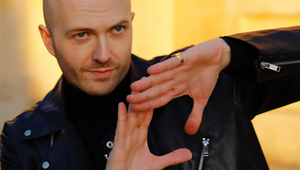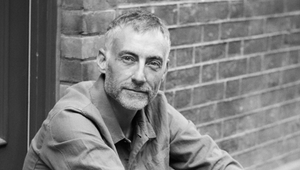
Meena Ayittey Gets Frank About the Industry and Finding Inspiration in Fine Art

Meena Ayittey is an award-winning film director and screenwriter whose work doesn’t shy away from tackling difficult subjects or asking uncomfortable questions.
She studied fine art at Central Saint Martins but soon became disillusioned with the categories her tutors wanted her to fit into. Today, she still finds inspiration in all things fine art, using its language to inform her visual style. Her latest project ‘Here We Are’, in partnership with Panasonic and Lumix, is a series of short films delving into the lives, desires, fears, and ambitions of 12 Ghanaian women.
Clear on the issues still plaguing the industry today, Meena spoke openly about what needs to change, and why film has the power to alter tired perceptions...
LBB> The twelve short films you created in partnership with Panasonic and Lumix are titled ‘Here We Are’ — could you talk about how you came up with the title and what is the significance of such an affirmative statement?
Meena> When conceiving this project, I made a point of trying to find women I wish I had seen represented when I was growing up. When I look back at my childhood and growing up in the 90s, how few Black women there were on screen that I could relate to. Even from an early age I could identify racial stereotypes that I could not relate to.
As a kid growing up my friends were goths and skaters. I listened to heavy metal. I played the piano, read Kafka, watched David Lynch movies and dreamed of making my own films one day. I have always longed to see Black women portrayed in a fully multifaceted way, in all our unique guises. I am proud to be an advocate for 'strong Black women'. However, we also need to see Black women feeling vulnerable, scared, introspective, curious. We do not always feel strong and that's okay.
The statement 'Here We Are' is an overwhelmingly positive one. Ghanaian women who are creative, unapologetic and ambitious. These are the women I want to see represented in the media. These stories exist in the world, we simply have to go out and find them.
Panasonic reached out after I mentioned I was shooting this project in Ghana on my GH5, a camera that is versatile and user friendly. The smaller lens size (micro four third lens) allows for ease of use while traveling around, so it was perfect for the project. Panasonic mentioned specifically how committed they are to amplifying diverse voices and the voices of women in particular. I am incredibly thankful to the UK LUMIX / Panasonic team for helping me to bring these stories to a global audience.
LBB> Were you surprised by anything you learnt from the stories you collected? Did any particular story stand out?
Meena> There was one thought shared by entrepreneur Abena Archempong that struck me. It was a moment where she stated that as a woman, it is common to doubt oneself. However, without experiencing trauma or self-doubt in her past she would not be the person that she is today. I find this hugely empowering. I really believe that we are a result of all our past experiences, the good and the bad. Accepting that we are often at the mercy of our past explains why we as humans behave in the ways that we do. Not that this should be used as an excuse for bad behaviour! But I do believe that by understanding our past we can understand ourselves a bit more.
The most shocking anecdote I heard was from CEO Awo Kwaison Saikey, who relayed that when she first arrived in the US from Ghana, several decades ago, she was asked “Where is your tail?”, the implication being that with her Black skin and African features she was seen as someone who wasn't even human. Granted, she explains that this was a long time ago, but I distinctly remember how calmly she relayed that scenario, while I was fuming.
LBB> Your work aims to dispel a lot of myths and preconceptions people hold. Why do you think that film is a good medium to help with this?
Meena> Film is immediate. It has the unique ability to engage people on a deeply emotional level within a relatively short space of time. As human beings we crave emotional engagement. I feel that by understanding each other, we can formulate empathy, and then with that, compassion. For me, film is the perfect medium to do it.
LBB> You have previously spoken about the overt racism present in the ‘70s and the systemic racism of today. How do you see this manifesting in the industry?
Meena> I think the racism in the UK today is a very different brand of racism that my parent's generation had to deal with. My parents spoke about the overt prejudice they faced after arriving in London from Ghana in the late ‘70s. They got called names in the street and were constantly told to “go home.” This brutal brand of racism is at least identifiable. I remember going to Oxford Street as a child in the mid ‘90s and being followed around a department store. I recall asking my mother “Are we famous?”, to which she replied “No, we're Black.” From then on, I would spend subsequent decades trying to decipher this new brand of racism that was deeply ingrained in every aspect of British society. This brand of racism is less overt, somewhat quieter, and even more insidious
For me, in the industry, this has manifested in a range of equally hilarious and disturbing scenarios. I've been the only Black person in the room, in the building, or even in the agency. I've been asked to “remove Black people from this edit.” I've had my experiences as a Black woman questioned. As a filmmaker, it is immediately obvious to me that the industry is in desperate need of more Black and Brown voices. This need for diversity is a conversation that has been loud in our industry for some time now, but the pace of change is glacial.
Trailer for Black Creative: Race and the Advertising Industry
LBB> What can the industry do to continue combating issues of systemic racism?
Meena> Hire more Black people and give them the tools that they need to succeed. Can't find Black people? Rubbish! There are multiple platforms across social media that specialise in promoting Black and Brown talent. That excuse doesn't cut it anymore.
LBB> You have a degree in Fine Art from CSM. Do you still turn to fine art for inspiration and could you please tell us a little about it?
Meena> Absolutely. The process of developing an idea into a medium that other people can visualize, interpret, and experience is a process that is infinitely valuable whether you are talking about painting, sculpture, film or music. Ironically, I spent a lot of my time at Saint Martins studying film. But I also took a lot of inspiration from painters including Edward Hopper, Caravaggio and mixed media artists such Kara Walker Yannis Kournellis.
When I look at a painting by Chris Offili or Kerry James Marshall, I immediately feel something. I then go back and deconstruct what it is that I'm feeling and why. Is it the composition, the colour? The figures in the work or the lack thereof? I can then feed this back into my own work as a filmmaker. If I want to create a feeling of tension for the viewer, how do I do it? What camera moves, what music, what location will tell the story I want to tell and give me that feeling I am trying to create? I often turn to art for inspiration or to remind myself of the power of images to generate emotion.
LBB> Does the language of fine art translate to film? If so, how do the two interplay in your work?
Meena> I firmly believe that the language of art and film are interlinked. With both mediums, the creator sets out to evoke an emotion, to describe or generate one that has been felt. The fine artists Issac Julian and Steve McQueen use the medium of film to explore the complexities of the Black British experience. Lighting, composition, and the use of action to set tone all play a part in trying to create that experience for the viewer and I do the same in my own work.
McQueen, in particular, is now predominantly a filmmaker and a master at developing characters that are not always pleasant but ultimately human. It is this portrayal of humanity with all of its flaws and guises that has always intrigued me about art. We look at the Mona Lisa and get lost in the details of the composition, the mystery behind her smile. I watch Clarice Starling in Silence of the Lambs and ponder about her childhood experiences that made her the character she becomes in the film. I am fascinated by the complexities of human emotion and how they manifest in life.
LBB> You’re on the Animation jury for D&AD 2021. What kind of work are you hoping to see?
Meena> D&AD is always wonderful, but I have high hopes for this year in particular. I think that the pandemic and the call for more representation in the industry has sparked a lot of conversations and enabled more creative solutions to film making. I also hope that there are more women and people of colour actually creating the work this year. Viva la Vulva was ground-breaking in many ways and I hope projects such as ‘wombstories’ and #LetYourBodyFlow get the recognition that they deserve.
Bodyform's #LetYourBodyFlow Campaign
LBB> What has the last year looked like for you since joining Great Guns?
Meena> It has been pretty non-stop! Lots of panel events and meetings about potential projects, which is exciting! There have been wonderful opportunities to showcase my work across the industry and several agencies from the USA have also reached out about future collaborations. I am currently in talks with several platforms about developing a series. I have several projects in development that I will be shooting this year and I am also in the process of writing and developing several scripts for both TV and film.
LBB> Tell us a little bit about what’s next on the horizon for you and your work.
Meena> I made a trip to Cape Town early this year and unearthed a story that led to me bringing a group of people together to help fund and produce a new short film. It focuses on the LGBTQ community and the tradition of male circumcision, which signifies the transition from childhood to adulthood. Without the help of Great Guns, Ground Glass, and fellow director Rodrigo Rattazzi it would never have happened. I then went to explore Egypt, and just got back with a drive full of incredible footage. I’m editing now, with great hopes for the film.















